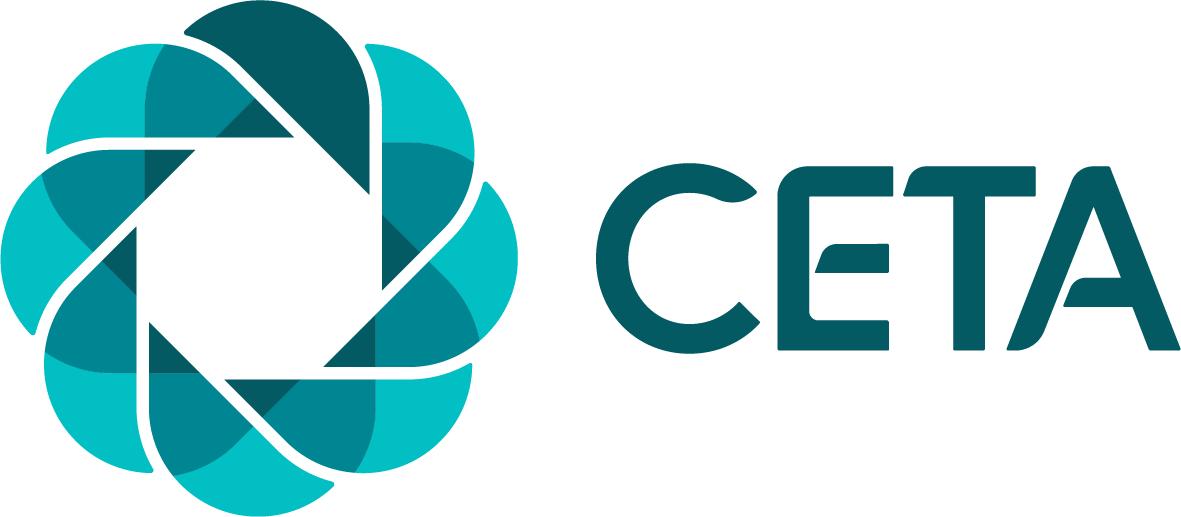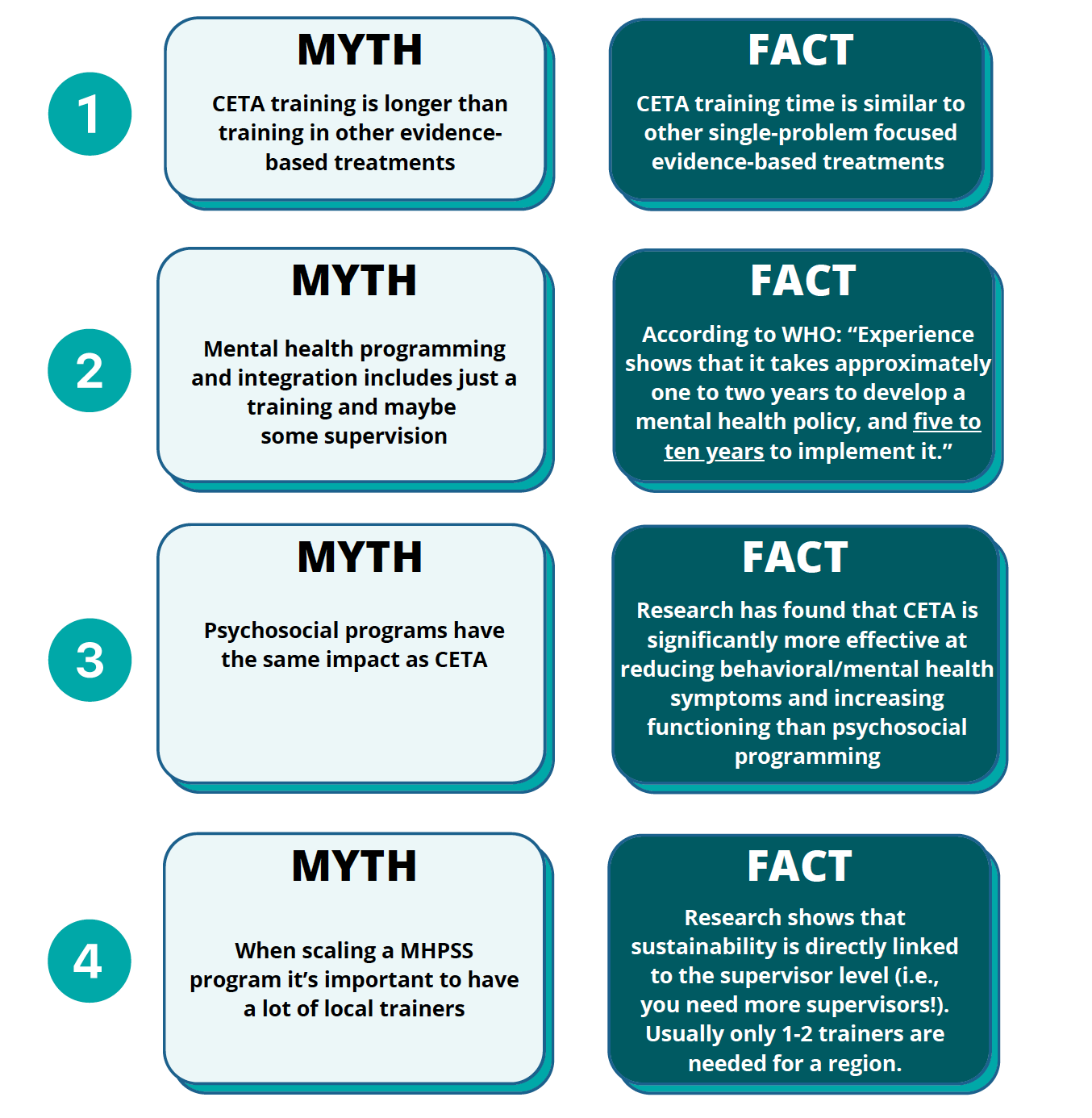A TOOLKIT FOR GLOBAL PROFESSIONALS
CETA offers a range of training and consulting services to partner organizations around the world. The following provides a series of tools for global development professionals.
Policy Briefs
We have created a series of briefs that provide information in a concise and helpful way.
CETA OVERVIEW
A brief background on what CETA is, the elements it includes and some of the evidence showing its effectiveness.
CETA Short Sessions
A brief look at how you can use select specific CETA elements (e.g., Thinking in a Different Way Part 1 and safety) as psychosocial programming.
Safety brief
A brief look at the “safety” element of CETA and how all programs and contexts can help prevent deaths by asking about suicide and abuse.
zambia | RAndomIZED Controlled TRIAL
A policy brief outlining our work in Zambia examining evidence how CETA can reduce violence and substance use.
System of Care
A brief explanation of the CETA System of Care and what makes it unique in the field of global mental health.
research
Our team strongly believes that it is not enough to provide services - but that everyone deserves access to quality, effective programs. Therefore, we have been committed to the scientific study of effectiveness and implementation of CETA to ensure that CETA works in a variety of contexts, settings, and populations.
Papers
Research Trial Case Studies
videos
The following provides a series of short video clips highlighting our work with partners in the field around the world.
Common Elements Treatment Approach (CETA Overview)
We have completed a randomized trial of CETA in Zambia looking at its effects on substance use and violence. This video highlights CETA’s work in Zambia with our local partners and the Ministry of Health.
One Family’s Story of Change
Our ultimate goal is for people to be healed and their lives are improved. We often get asked, “how do you work on such difficult issues like abuse, violence, rape, and substance use?” We are driven to do this work when lives are changed for the better. Here’s one family’s story of change.
Thinking in a Different Way
Watch one of CETA’s developers, Dr. Murray, during a training session modeling the TDW1 skill for participants.
Group Role Play
In CETA training, there are lots of practice group role plays with active coaching to help trainees learn skills. Here you see one of our local Zambian supervisors coaching trainees through a role play exercise.
Training of Trainers
The CETA program focuses on scalability and sustainability. This video shows two supervisors who are now practicing to be trainers by modeling a skill, and being coached in how to train by Dr. Murray and Ms. Skavenski.
Element Decision-Making
We often get asked how we teach lay providers the decision-making aspect of CETA. This short clip shows one of the developers, Dr. Murray, teaching this approach to lay providers in Zambia.
Card Sort
Watch how CETA trainees get practice in decision-making by case presentations.
SHARED TOOLS
Resources from partners and respected organizations for global health professionals.
PRESS / MEDIA
Frequently Asked Questions
WHAT IS CETA?
The Common Elements Treatment Approach (CETA) is a "system of care" that has multiple evidence-based
steps and processes embedded into it. These include:
Implementation
CETA in its entirety is built off Implementation Science principles, research, and experiences. These include
understanding processes within contexts, fidelity, acceptability, flow and ease of system, integration
principles (e.g., into other health care systems), choice and payment structures of staffing, organizational and
leadership development, strategic planning, costing/budgeting, and sustainability. The largest part of our
expertise and success is within these processes and capacity building.
Assessment of mental/behavioral health
In any MHPSS system, a reliable, practical way of assessing problems is required to get someone connected to
the right program, or measure change. Our system uses a multi-problem Client Monitoring Form to assess,
refer, and monitor improvement.
Triage to appropriate MHPSS services
Based on research and experience, the CETA system can triage individuals or groups to different levels of
care, from prevention/wellness all the way through treatment and maintenance. This includes the integration
processes, soft connections, follow-up, and tracking systems.
Treatment
Within the system of care is training in evidence-based elements that can be used individually and/or in
groups to address a wide range of behavioral/mental health problems-from wellness to clinical care.
Treatment iS appropriate for children, adolescents, adults, families, those with medical comorbidities (e.g.,
HIV), and is adaptable to most populations globally. Training can be done in person, via technology or in
hybrid. We can train lay providers and professionals. Certification is included at an array of levels, and for in-
person and/or technology delivery.
Safety for suicide/violence/abuse
Using science-backed processes that we have honed over decades, the CETA system of care is wrapped in
constant assessment, checking, and management of safety challenges like suicide, violence, and abuse.
Extensive capacity building is done with providers, integration of on-call scheduling, development of referral
pathways for different urgent situations, as well as oversight.
Monitoring and Evaluation
We use the latest science to monitor and track all implementation aspects of the CETA system of care. We are
flexible in the amount of technology we use based on context/setting, as well t back-end visualizations of
information.
WHAT ARE THE ECONOMIC ADVANTAGES OF CETA VERSUS SINGLE OR DOUBLE-PROBLEM FOCUSED TREATMENTS?
Building an MHPSS program for a population or specific age group within a population (e.g., veterans, or adolescent girls affectted by HIV) must consider individuals will ALWAYS present with comorbidity. To address this comorbidity, you would need [LM1] to implement and sustain 5-10 different treatments. The cost of this - versus the CETA system of care that addresses comorbidity - is astronomical.
WHO CAN DELIVER CETA?
CETA can be delivered by a range of lay providers and mental health professionals, including:
Psychologists and psychiatrists
Medical professionals, including doctors and nurses
Community based health workers
Community organization or health clinic volunteers
We have learned CETA trainees that are most successful have the following:
Sufficient time to train in and deliver CETA (10 days for training and about 2-3 days/week dedicated to CETA)
Can speak the local language
Organizational skills
An understanding of their community and its problems
A passion to help their community
Logistical support from their organization (materials, space for CETA, etc.)
WHAT ORGANIZATIONS CAN UTILIZE THE CETA SYSTEM OF CARE?
Partners can work with the CETA team at either Johns Hopkins Bloomberg School of Public Health or through CETA Global Inc. There are currently no other organizations or groups that can independently work on CETA projects. The CETA team regularly partners with organizations and individuals to help integrate the CETA system into their organization.
HOW DO YOU INTEGRATE THE CETA SYSTEM OF CARE INTO AN ORGANIZATION? WHAT DOES THIS INCLUDE?
The CETA system of care focuses on both implementation and monitoring/evaluation. We take into consideration the organization's mission, needs, and existing system to determine the type of programming and the system building that is required. This may include working with organizational leaders and staff to identify the select CETA elements that will most benefit the beneficiaries, creating new or updating exiting monitoring and evaluation systems to provide outcome data on program effectiveness, and/or addressing larger implementation (e.g., retention, reach, etc.) issues within the organization. We work with organizations to provide pieces of the puzzle required to implement effective, efficient, and data driven programming to maximize results.
CAN YOU PROVIDE TRAININGS WHEN THERE ARE COVID-RELATED RESTRICTIONS ON TRAVEL OR GROUP GATHERINGS?
Yes! We have a range of approaches to training, including traditional live training, virtual training via video conferencing, and technology-assisted training using our CETA Training App. The CETA Team will work with your organization to determine the best approach for your context.
HOW DOES THE CETA TRAINING APP WORK? CAN IT BE USED IN PLACES WHERE THERE IS POOR INTERNET CONNECTION?
The CETA Training App consists of animated didactic videos, video recordings of example CETA sessions, interactive activities and quizzes, and role play scenarios for counselors in training to practice their CETA skills. The content in the CETA Training App can be downloaded and used without internet access. Asynchronous content is used in combination with support from a live trainer who answers questions, observes role play practice, and provides feedback on counselor performance. This live trainer can be located on site or remote depending on the needs of the organization and resources available in each context.
HOW DO WE PARTNER TO INTEGRATE CETA INTO OUR ORGANIZATION? WHERE CAN I GET MORE INFORMATION ABOUT CETA?
CETA was created and tested by faculty at Johns Hopkins Bloomberg School of Public Health. To gain access to technical assistance materials, please reach out to info@cetaglobal.org. From there, we can direct you to Partners and regional trainers that work closely with us and also have access to materials.
Myths and Facts







